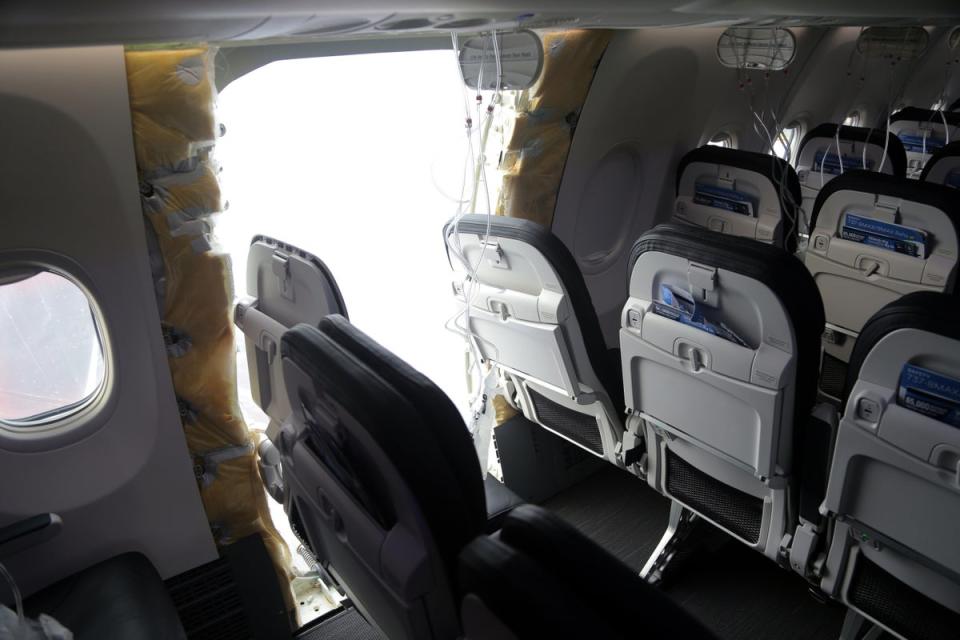Boeing to be offered plea deal by Justice Department over deadly 737 Max crashes
Embattled aircraft manufacturer Boeing is close to reaching a deal with the Department of Justice to plead guilty to criminal charges over two deadly 737 Max crashes in 2018 and 2019.
The aerospace giant is accused of violating a 2021 settlement related to the two fatal crashes, which took place within five months of each other and killed a total of 346 people – first in Indonesia in October 2018 and then in Ethiopia in 2019.
The DOJ first brought charges of conspiracy to defraud the United States against Boeing in January 2021, alleging it misled the Federal Aviation Authority (FAA) during its evaluation of the 737 MAX aircraft.
At the time, the company entered into a deferred prosecution agreement with the DOJ, agreeing to pay fines of $243.7m, $1.77bn compensation to airline customers and $500m to the crash victims’ beneficiaries.
Boeing was also forced to disclose any allegations of fraud, cooperate with the government and avoid committing any felony offense. Under these conditions, the DOJ agreed to defer criminal prosecution for three years.
However, this May the DOJ said that Boeing – which is in turmoil over a string of safety scandals – had failed to live up to its obligations under the agreement.
Now, the DOJ is proposing a new deal that would see the company plead guilty to conspiracy charges but avoid criminal trial, attorneys for the families of the crash victims told ABC News.

The company must also agree to the appointment of an external corporate monitor, pay a fine of about $200m and remain on probation for three years, the lawyers told ABC News. Under the deal, the company would also avoid going to trial.
“The company would be absolutely brutalized in a highly public trial,” Mark Lindquist, another attorney for crash victims’ families, told ABC News. “Boeing has way too much dirty laundry to risk the bright spotlight of a trial.”
Lindquist said Boeing has until July 7 to accept the deal. If Boeing rejects the terms, the DOJ can pursue criminal prosecution.
It is unclear if Boeing plans to accept the deal. The company previously disputed the DOJ’s findings that it had violated the 2021 agreement, saying that it had “honored the terms” of the 2021 settlement and looked “forward to the opportunity to respond to the Department on this issue.”
“As we do so, we will engage with the Department with the utmost transparency, as we have throughout the entire term of the agreement, including in response to their questions following the Alaska Airlines 1282 accident,” a spokesperson for Boeing told The Independent last month.
Families of the crash victims have expressed dissatisfaction with the DOJ deal, arguing that it contains no accountability and no admission that Boeing’s alleged conspiracy caused the deaths of 346 people. The victims’ families have been pushing the DOJ to take the company to trial and to impose fines upwards of $20bn.
“I don’t understand why they’re offering the plea deal. They don’t need to,” Nadia Milleron, mother of Samya Rose Stumo, 24, a Massachusetts native who died in the Boeing Max crash in Ethiopia in 2019, told ABC News.
“They should just take them to trial.”
The proposed deal comes one day after Boeing announced plans to acquire Spirit AeroSystems for $4.7bn in an all-stock transaction. Boeing previously owned Spirit and the aerospace company said bringing the supplier back into the Boeing fold would improve plane quality and safety.

Boeing continues to face increasing scrutiny from regulators, Congress and airlines after a door panel blew off a 737 MAX plane mid-air during an Alaska Airlines flight in January. Several passengers on board were injured in the incident, which grounded all Boeing 737 MAX 9s and prompted investigations by the FAA and the National Transportation Safety Board, into the aircraft manufacturer and Spirit AeroSystems, which made the door plug.
Reports released since have suggested the plane did not have the critical bolts it needed to keep the door plug in place when it left the factory.
Meanwhile, the company has been fighting a string of allegations from whistleblowers in recent months regarding the company’s manufacturing process.
Boeing CEO David Calhoun appeared in front of a Senate hearing last month, where he was questioned about production inspection processes and whistleblower safety.
During the hearing, Calhoun apologized to the families of the crash victims, saying the embattled company was “totally committed” to future aircraft safety.
In March, Boeing CEO Dave Calhoun announced he would be resigning from his role at the end of the year following what he described as a “watershed moment” for the company after the Alaska Airlines incident.


